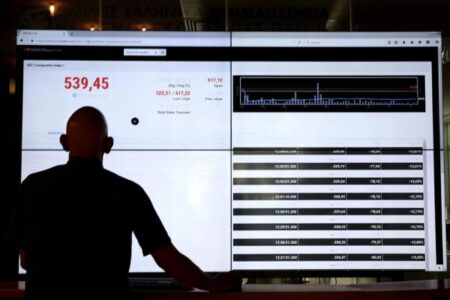By Douglas Gillison
(Reuters) – Wall Street’s top regulator on Wednesday unveiled rules allowing stock markets to price shares in increments of half a penny, rather than the current minimum size of 1 cent, aiming to promote more competitive pricing and reduce investor costs.
The five-member U.S. Securities and Exchange Commission was due to convene at 10 a.m. ET (1400 GMT) to vote on the measure, first proposed in 2022 as part of a broader package of market structure reforms. Though the SEC is often sharply divided on political lines, the commissioners unanimously proposed the pricing changes.
The rules apply to the highly technical space between the prices that stock sellers are willing to accept in a trade and what buyers are willing to pay, known as the bid-ask spread, for the multitrillion-dollar U.S. equities markets.
Allowing prices to be quoted in increments, or “tick sizes”, of less than a penny will result in narrower spreads, cutting transaction costs and allowing for more aggressive pricing, according to the SEC.
Prior to the vote, SEC officials told reporters that 2023 data showed that as many as 1,700 stocks would have qualified as “tick constrained” under the rule due to be adopted, meaning a weighted average of the spread was 1.5 cents or less over a certain period.
The SEC’s decision not to include pricing increments smaller than half a cent represents a likely win for industry, which had favored the half-penny increment and objected to sizes included in the 2022 proposal that were as small as a fifth or a tenth of a cent.
Market maker Citadel Securities said such small sizes threatened to reduce liquidity and worsen investor panic in times of stress. Other industry participants pointed to problems such as “queue jumping,” in which buyers jump ahead of existing orders by placing bids that are only fractionally higher.
If adopted, the new rules subject to Wednesday’s vote are due to take effect in November 2025.
They are part of a broader SEC effort at adopting what would be the largest market structure reforms in nearly 20 years, in part driven by the GameStop (NYSE:) trading frenzy of 2021, in which retail traders suffered substantial losses.
The agency last year shortened the trading settlement cycle to help reduce default risk and in March of this year adopted rules requiring expanded public reporting on the quality of trade executions by broker-dealers and others.
Read the full article here
















